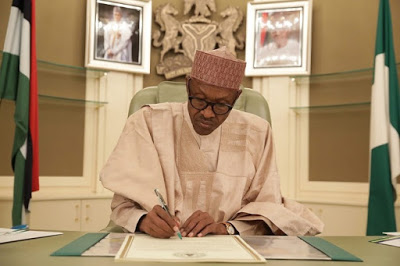
Over
the course of the past week, Nigeria’s President
Muhammadu Buhari approved travelling restriction on no fewer than 50 high
profile persons directly affected in investigations by security agencies
in the country. By this, the persons cannot
travel out of Nigeria pending the determination of their cases. Furthermore,
the presidency states that the measure is part of the implementation of
Executive Order Number 6, which seeks to ensure “that all assets within a minimum
value of N50 million or equivalent, subject to investigation or litigation are protected from dissipation by
employing all available lawful means, pending the final determination of any
corruption-related matter.” The Presidency seeks to support this
directive with the recent decision of the Federal High Court which supports the
powers of the president to make the Executive Order in the first place. You may
view the provisions of Executive Order, No. 6, here.
the course of the past week, Nigeria’s President
Muhammadu Buhari approved travelling restriction on no fewer than 50 high
profile persons directly affected in investigations by security agencies
in the country. By this, the persons cannot
travel out of Nigeria pending the determination of their cases. Furthermore,
the presidency states that the measure is part of the implementation of
Executive Order Number 6, which seeks to ensure “that all assets within a minimum
value of N50 million or equivalent, subject to investigation or litigation are protected from dissipation by
employing all available lawful means, pending the final determination of any
corruption-related matter.” The Presidency seeks to support this
directive with the recent decision of the Federal High Court which supports the
powers of the president to make the Executive Order in the first place. You may
view the provisions of Executive Order, No. 6, here.
However, it is important to note the decision of the court in
relation to the powers of the Attorney – General of the Federation, as the
court further
noted that the order seemed to accord the AGF the discretion to decide when to
seek court’s permission to seize any suspected property and the court held that
the AGF must at all times, obtain a court order before confiscating any asset.
relation to the powers of the Attorney – General of the Federation, as the
court further
noted that the order seemed to accord the AGF the discretion to decide when to
seek court’s permission to seize any suspected property and the court held that
the AGF must at all times, obtain a court order before confiscating any asset.
We must therefore ask
ourselves, did the Attorney – General of the Federation or presidency seek a
court order before directing that travelling restrictions be placed on over 50
Nigerian citizens? Sadly, no information has been provided by the Presidency on
this point.
ourselves, did the Attorney – General of the Federation or presidency seek a
court order before directing that travelling restrictions be placed on over 50
Nigerian citizens? Sadly, no information has been provided by the Presidency on
this point.
Also, it important we
examine what the constitution says? Section 41of the Constitution provides for
the right of all Nigerian citizens to move freely. Furthermore, Subsection (2)
provides that nothing shall invalidate any law that is reasonably justifiable in a democratic society imposing
restrictions on the movement of any person who has committed or is reasonably
suspected to have committed a criminal offence in order to prevent him from
leaving Nigeria.
examine what the constitution says? Section 41of the Constitution provides for
the right of all Nigerian citizens to move freely. Furthermore, Subsection (2)
provides that nothing shall invalidate any law that is reasonably justifiable in a democratic society imposing
restrictions on the movement of any person who has committed or is reasonably
suspected to have committed a criminal offence in order to prevent him from
leaving Nigeria.
Therefore, in determining if
the President’s directive has breached the rights of any persons concerned, one
must ask if the President’s actions are lawful and reasonably justifiable in a
democratic society. The legal position however states that for it to be
justified, such travel ban must be in accordance of a lawful court order.
the President’s directive has breached the rights of any persons concerned, one
must ask if the President’s actions are lawful and reasonably justifiable in a
democratic society. The legal position however states that for it to be
justified, such travel ban must be in accordance of a lawful court order.
THEREFORE FOR THE PURPOSES
OF THIS POST, IF THE PRESIDENT CONSENTED TO THE TRAVEL BAN AND ORDERED SAME WITHOUT
THE LAWFUL ORDER OF THE COURT, THEN HIS ACTIONS ARE NOT JUSTIFIABLE IN A
DEMOCRATIC SOCIETY AND IS THEREFORE A BREACH OF THE CONSTITUTIONAL RIGHTS OF
ALL 50 PERSONS WHOSE NAMES APPEAR ON THAT LIST. CONSEQUENTLY, THE AGF CAN BE
SUED FOR THE FUNDAMENTAL BREACH OF THEIR HUMAN RIGHTS.
OF THIS POST, IF THE PRESIDENT CONSENTED TO THE TRAVEL BAN AND ORDERED SAME WITHOUT
THE LAWFUL ORDER OF THE COURT, THEN HIS ACTIONS ARE NOT JUSTIFIABLE IN A
DEMOCRATIC SOCIETY AND IS THEREFORE A BREACH OF THE CONSTITUTIONAL RIGHTS OF
ALL 50 PERSONS WHOSE NAMES APPEAR ON THAT LIST. CONSEQUENTLY, THE AGF CAN BE
SUED FOR THE FUNDAMENTAL BREACH OF THEIR HUMAN RIGHTS.
Adedunmade Onibokun
Adedunmade is a lawyer and
founder of the legal educational blog, @Legalnaija.
founder of the legal educational blog, @Legalnaija.
@adedunmade
